#i think also we need to bring in more nuance to these discussions
Text
To follow up on my last post i've seen a lot of people, both on discord servers and on tumblr ask if "they can enjoy Sky even with all the controversy". And I know a lot of you guys are young and/or striving to be perfect 100% of the time and i gotta say
Yes. You absolutely can.
You can 100% enjoy and even pay for Sky while still criticizing/support people criticizing the game. You're not gonna be deemed problematic or shunned or whatever. There are nuances to this discussion. It's not all on one side or all on the other. Hell, if most of the critics didn't like sky on some fundamental level, they wouldn't be criticizing it. They'd just move on to another game. Sky is always going to be there.
The only reason why i say "match the amount you pay into artist's pockets" isn't because of some Christian idea of penance or whatever (I'm jewish) but to support the artists that continually keep the community alive while get screwed over by TGC. They are our lifeblood, and they deserve both nonmonetary and monetary support as much as possible. If TGC wants to steal from them, they need to be compensated.
The only reason you should feel guilty in this community is if you're harassing critics/enjoyers. That's never okay and frankly disgusting.
#critical thinking#sky cotl#skyblr#sky children of the light#i love so many people in this community#but i hate having to constantly reassure them that this is OK#and i get needed reassurance because i'm like that too#but hopefully this post will bring comfort to people#i think also we need to bring in more nuance to these discussions#because multiple points can be true#yes sky tgc has been dogshit lately on their PR and their original values while making the game have gone down the shitter#but critics at the end of the day can't force people to do anything#just be mindful and critical of your choices#and enjoy yourself#as a great man once said: if it's not fun#why bother?#indie game#thatgamecompany
310 notes
·
View notes
Text
On Outrage Marketing and How To Stop It (ATLA Live Action)
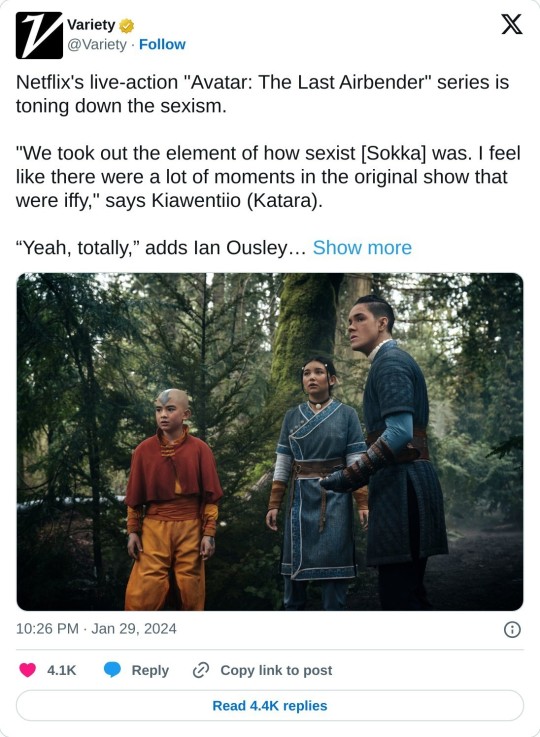
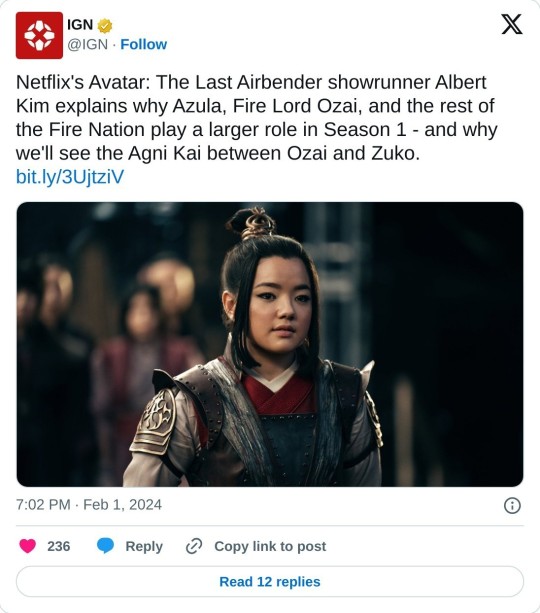
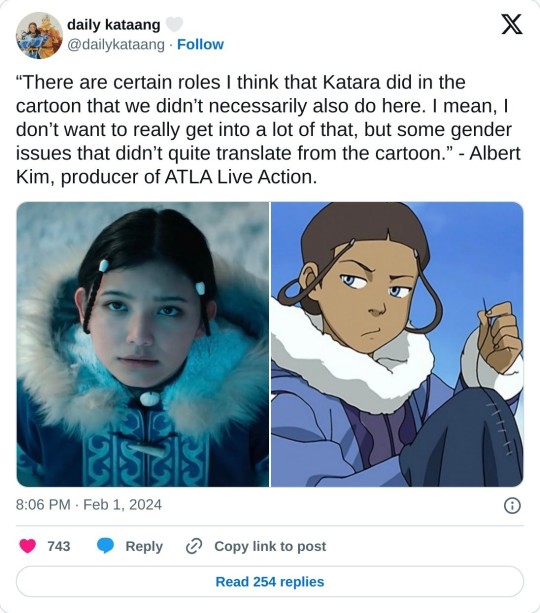
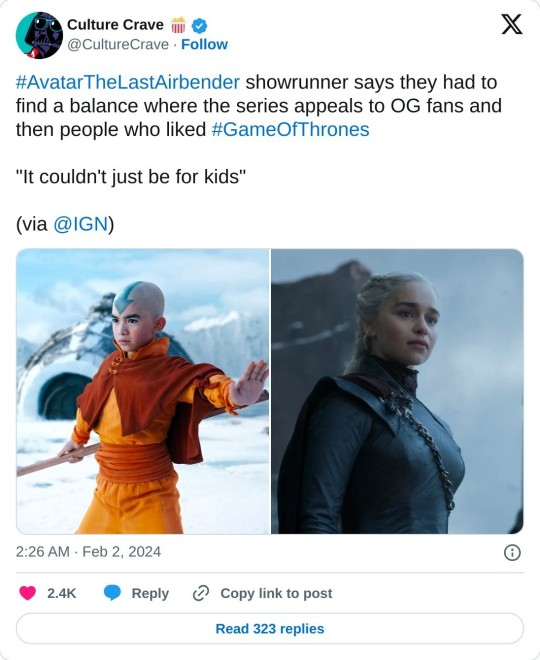
I’m sure we have all noticed an uptick of aggression and frustration against fellow fans on this and other social media sites.
Depending on your perspective, you may think that other fans are being overly critical and hysterical or complaining just to complain.
Alternatively, you may believe that other fans have descended into toxic positivity and are dead set on silencing all discussion and dissent, even if it’s the slightest bit critical or questioning.
The reality is: both are true and false.
This is outrage marketing.
As much as we can dunk on Netflix for their past decisions, they’re not idiots. This isn’t a case of the actors and director not knowing when to shut their mouths. These media outlets are not doing hard journalism and bringing us the facts: this is sponsored content. The studio is PAYING to put these stories out there.
Why? And why so close to release?
Exactly for the reasons you’re seeing: to make us fight publicly on social media.
Look at it this way. How long did it take for the trailer hype to die down and for it to stop trending everywhere? A week?
Meanwhile, how much longer can outrage carry hype and word of mouth? For months or even YEARS. All the outrage clickbait we have seen in the past with Disney products especially (Star Wars, Marvel) is intentional outrage marketing. It keeps people talking, which keeps the content trending, which keeps spreading the word and building hype in a time where content is myriad and every IP needs to compete to keep your attention.
Basically it works like this:
Group of fans #1 are fed these interviews by the algorithm and make criticisms or express concerns.
Group of fans #2 are fed the most exaggerated or hyperventilating takes from the first group to create the illusion of irrationality.
Group #2 decries the “hysterical” fans and lump every bit of criticism into this, silencing dissent.
Group #1 feels censored and attacked which makes them even more aggressive in their criticisms.
Rinse and repeat. Bots can also be used to help foster this hostile environment. Reddit and Twitter are known to be infested with fake bot accounted for this reason.
Meanwhile, the much larger group of audience members just sees ATLA is trending and there’s a lot of buzz and tons of pictures that are aesthetically interesting so they are interested in the show.
So how do we stop it?
By no longer making the repeated posts complaining about other fan reactions, and ignoring them when you do see them.
Instead, engage civilly with your fellow fans. Be curious. Try to understand their actual perspective before you attack. You can disagree without making a caricature of the opposition and interpreting them in the most uncharitable way possible.
This will produce more nuanced discussions and allow people to vent their concerns as well as share their excitement in a way less hostile or censored environment.
Thank you to all who took the time to read this. I love ATLA and I love this fandom.
353 notes
·
View notes
Text
da2's arishok is a good villain. if you have a fundamental understanding of the qun and listen to his thought process, the things he does makes sense. he uses the qun to justify slaughtering kirkwall's people, which is utterly inexcusable and what makes him a villain, but his character is complex enough to make dealing with him that much more thought provoking. he sends agents to kill petrice because she was killing his people, he doesn't give up the elves because they committed their lives to the qun, no matter how recently they converted, and he refuses to leave without the tome (and isabela) because his idea of justice hasn't been done. his logic makes sense, generally, though it is wrong on more than one occasion. he isn't moral, but he is methodical.
i feel this way about solas, too. i like da2's arishok for the same reasons that initially draw people to solas, i think. when we meet them, i find them interesting and educational to talk to, someone worthy of respect, and someone very honorable in their own way. similarly, many of my issues with solas compare with flaws in the qun/the arishok.
solas asserts that all of his beliefs are correct, and we're never allowed to challenge him on any of it. if he has high enough approval, he'll approach you to go, "yknow, i thought you were all [insert prejudice or stereotype] but YOU showed me that some of you guys are actually okay," which is NOT what it looks like for someone's beliefs to be challenged.
brief aside, i want to be fair in that we don't get this opportunity with many of the companions, and it's not even an inquisition specific issue. the dialogue format is agree, joke, be mean, and it's flawed, but it works in the majority of interactions. we don't really get to engage in nuanced discussions with characters, but there are positives and negatives to the system overall. it is possible to challenge and shape a character within this dialogue system (i.e., garrus vakarian) but in dragon age that really only comes in the form of harden/unharden. it was a little more doable with origins' system, but it really hasn't been a huge part of any dragon age game. most characters' beliefs remain largely unchanged by you regardless of how you play.
solas also possesses a strong sense of duty and purpose, though what duty he has, what his true goals are, he keeps hidden as long as he can. the most damning comparison though, to me, is how willing he is to destroy the world and bring back "his people," while the qunari fight to conquer the world and homogenize society into "their people."
in any case, with both him and the arishok, you can see the wheels turning in their heads. you can see why they do what they do, even if it's wholly immoral. it makes their threat a lot more personal, a lot scarier, psychologically, that a "normal" person, who doesn't want to cause suffering, can hold such specific beliefs and such strong conviction that knowing that they'll hurt people doesn't give them any pause. the root of their motivation is understandable. solas wants to right his wrongs, at his core. the arishok implicitly believes that the qun is safer, better for its people than life outside the qun. we can see that they're taking it too far, but they don't care. it makes them good villains.
"i am not corypheus, i take no joy in this." sure, which is a very similar sentiment, emotionally, to the qunari sense of duty. you can say you don't enjoy it all you want, you're still committing genocide. you can hate the qunari all you want, but you fight with their ferocity, their unshakeable faith in their own cause. their need to "do what's right," no matter who's caught in the wake.
i understand why people like solas, i go back and forth on it myself, but i don't think he's all that different from the arishok in method and motivation. they're each thrust into a world so different from what they believe is "right" that they demand it change around them. if we had to kill the old arishok, then if solas refuses to give up, he will have to die. he doesn't get to do genocide just because he's romanceable. he's a good character, he's a good villain, but he's not a good guy, and unless he stops before he does any real harm (which he will not do), he should share the arishok's fate.
#ive had a hard time trying to put words to the way i feel about solas#but this does it#solas is a good character and quite likeable for lots of reasons#especially in inquisition's main story#but end of the day hes not a good fuckin dude#also please engage with this it took me like three hours#da discourse#cw: genocide#dragon age#dragon age 2#dragon age inquisition#da2#dai#the arishok#solas#fen'harel
453 notes
·
View notes
Note
hi, recently i learned from your blog about the true meaning of zionism and what it actually means to jewish people, so i dont use the word zionist anymore and now i say "pro israel people" (but is that still problematic?). ive read from a couple palestinians who expressed their frustration about being policed on using the word "zionist" and having it taken away from them, as it is what they've called their oppressors since the occupation began. and as for the pro pali circle, especially the one that im in, we all support jewish self-determination but we do not support the state of israel because it was built on the nakba. we don't want "death to the israelis" and we also believe that the state of israel needs to be dismantled because its existence is what continues to oppress the palestinians.
so i explained all this because im not exactly sure if there is any antisemitism in this line of thinking? i want to be pro pali but i dont want to be antisemitic while im at it. i wasnt sure who to ask about this but since im learning a lot from you, i hope its okay that im asking you about this. thank you
hi! i hope it's alright i took a bit gathering my thoughts on this, i wanted to make sure i had a good array of opinions to give your response the proper attention it deserves. i ran my ideas past some people and gathered some additions from them, so hopefully it's at least a start
i'm gonna put this under a cut bc i just know it'll be long. sorry in advance about all my parentheticals lmao
first, i want to mention that for palestinians specifically, i honestly don't blame them for not accounting for the wide spectrum of usage of the word zionism. zionism is an incredibly present and specific threat in their lives, even if it is a very very narrow zionism in the wider scheme of things. when you're spending all your time in fear and trying to survive oppression or trying to just keep yourself alive, you don't exactly have time for nuance. my gripe is with non-palestinians who do have the luxury to be nuanced and take a step back and learn about this sort of thing
second, don't be complacent about your circle all supporting jewish self determination. if there's anything i've learned in the last six months and five days, it's that a lot of leftist spaces, even ones that say the right things and have the right discussions, still have very antisemitic biases. a lot of leftists (at least in the circles i run in) are always going on about needing to be self-questioning, self-examining, open to accepting that they may be wrong, open to """unlearning biases""" but there's a line a mile long between talk like that and actually doing it. i don't know your community, but i can't begin to count the number of friends i've lost lately. just don't get complacent about this, please
third, some people identify using the phrase "pro-israel" to talk about being for its ideas rather than its actions (even tho that's not really the language i use). there are a lot of people (a lot of jews!!!) who love the state of israel and have been advocating against its actions and policies since day one. my rabbi gave me a list of books to read that address these other visions of a medinas yisrael that is more focused on coexistence and justice, if you're interested i can attach it.
i also want to note that "pro-israel people" includes the tel aviv protestors, who have been protesting against the government's attempt to get rid of democracy. all the organizations i list below can be called "pro-israel people" one way or another. i highly recommend just saying what you mean: "people who support the disproportionate response of the israeli government and military," "people who support the marginalization of palestinians and non-israelis in the region," that sort of thing (thank you @vhenadahls). a lot of zionists, "pro-israel people" are your comrades, and we need all the help we can get. don't alienate who you don't have to
i also want to bring up, since we're talking about the jewish definitions of things, the meaning of "israel" is also important to note here
am israel – the people of israel, aka what we now call "jews"
b'nei israel – the children of israel (same meaning as am israel)
eretz israel – the land of israel
medinas/medinat israel – the state of israel
it's important to mention that in most jewish texts and prayers, "israel" tends to refer to the people. i can't speak for anybody else but i know personally when i see someone identify as "anti-israel" my brain understands it as how it's used in jewish spaces, even when i logically know they tend to mean the state. that's just a personal thing tho, idk if this is something that also happens to others
fourth, and this gets into me-being-an-anarchist territory so head's up haha. i think like "we don't support [state] bc it was built on violence"—on one hand, yes and therefore you need to apply that to all states that fit such a mold with the same amount of vigor instead of only focusing on The Jewish One (tho if you ask me, an anarchist, i would say that violence is inherent in every state, and therefore every state should be dismantled). and if we're going that route, are you going to decide what takes precedence based on number of people dying a day? total number of deaths, or number per capita? or are you going based on length of time a conflict has been going on? whatever you do, don't base it off whatever's on your timeline the most. most people have already let ukraine leave their minds, and yemen and sudan never entered it to begin with. here's the acled's conflict watchlist for the year 2024 (side note, rather wild seeing the us on this list lmao), i recommend you take a look through this and really think about where your priorities should lie, or how to even choose. it's something worth thinking about, even if/when you decide that israel/palestine is the best usage of your time/energy [link]
okay but. on the other hand. even if you do all that, what are you going to do about it? great, you believe a state is bad. how are you going to make the world better? how do we balance that with the fact that for the past 2000 years most jews have been getting kicked out of one place and the next, and the hope of zionism is that finally jews will be able to rest and live somewhere. if we're proposing the introduction of a new state apparatus, how do we accommodate that (incredibly understandable!!!) jewish generational trauma? (side note while making challah today i started listening to an audiobook of "people love dead jews" by dara horn that i think is a really good book for other reasons obvi but you may personally be interested bc it is a very good expanation for why so many jews identify as zionists) how do we create a state that doesn't depend on the subjugation of The Bad Guys? how do we ensure that palestinians, israelis, armenians, the bedouin, christians, jews, muslims, are all represented and empowered? how do we set up a framework where those groups can not only coexist, but that those who were once kicked out may have an opportunity to return?
i think a lot of people kinda see "[state] is built on violence and needs to be dismantled" and then pat themselves on the backs and say good job everyone we did it, but the more important thing is "what next?" not just "we're yelling at underpaid starbucks employees and harassing our local city council to release a statement advocating for a ceasefire" which does NOTHING politically or socially, it's just fucking performative. how are you going to personally help take the steps necessary to not only dismantle that state but also make it do that in the absence of the state there won't be a shit ton of people in fear and desperate and who don't know how to live with the people around them and without creating a power vacuum that will inevitably lead to this cycle repeating for the hundredth time since 722 BCE and the assyrian overthrow of the kingdom of israel
in the words of another friend: "“What does it mean to support ‘Jewish self-determination’ while still calling for the dismantling of Israel? Through what means, in a time where we are constricted by nation-states, could an exceptionally small and marginalized minority population that is geographically and ideologically surrounded by nations that have called for its extermination, have self-determination, which requires basic safety, if the only nation-state designed to be a safe haven for them no longer exists? Why are we starting, of all of the nations currently engaged in explicit, harmful violence against others, with this very small country as the one that must cease to exist for its crimes?”"
i'm honestly not trying to make you feel hopeless, but i also think these are important questions we all have to deal with right now. in a way, i'm lucky—i'm an advocate in this subject because i'm becoming jewish, and through encountering antisemitism and disinformation, i've become kinda forced to start doing all the research i can. others can't answer that so easily. my recommendation is finding something concrete that you can address and focus on. for me, it's become facilitating and having difficult conversations about this very thing, to help emphasize the humanity of everyone in this situation and help us hopefully learn how to live together
i recommend looking into groups like:
breaking the silence – an organization focused on providing both current and former members of the idf the ability to anonymously talk about their experiences in the occupied territories
b'tselem – a group to advocate for human rights in palestinian territories and to document any violations
combatants for peace – coalition of ex-combatants in the israeli/palestinian conflict who have come forward to work towards ending the israeli occupation and advocating for peace in their shared land
the forgiveness project – this is a uk-based group focused on using stories of both victims and perpetrators to explore alternatives to seeking revenge. i cannot beg everyone enough to please watch this discussion they hosted between pcff's rami elhanan and bassam aramin
hadash – leftist political coalition working towards the establishment of a palestinian state alongside medinas yisrael, worker's rights, and much more
mesarvos – young israelis refusing the idf draft
parents circle families forum – organization of israelis and palestinians who have lost loved ones in this too-long conflict, focused on promoting dialogue
the road to recovery – organization to take chronically ill people from gaza and the west bank to israeli hospitals so they can get treatment
standing together – israeli-palestinian organization advocating for peace, equality, and social justice
this is not ulpan – joint hebrew-arabic school working to break down cultural divides by first addressing the language divide
zochros – organization advocating for the recognition of the nakba and instating the palestinian right to return
#tsiyyonus definition#anarchist#palestinian liberation#jumblr#jewish history#medinas yisrael#עם ישראל חי#peace activism#radical compassion
144 notes
·
View notes
Note
i was a trans man until after a lot of build up of doubting myself, i finally realized that we are putting ourselves further into boxes by not accepting that we are the biological sex that we are and we can do WHATEVER we want at the same time.
clothes and makeup and certain interests do not equal gender.
and not liking being a woman is an unfortunately natural symptom of puberty and/or experiencing society’s deeply ingrained misogyny. and everyone deserves support for those problems.
but we can all fight together against gender social constructs in a healthy way without prescribing people hormones and invasive cosmetic surgery to make them more like the sex they “should” be according to… social constructs…. and help them be comfortable in who they are
Alright. Its been like 9 fucking months that I have been staring down this ask. What better time than to give TERFs some nuance than right in the middle of a fucking hate campaign going on where people (well... singular person probably) are calling me a TERF. This wont backfire.
This post arrived in my inbox shortly after I made another post about gender, and just how fucking weird it can be, and how I genuinely believed every single person on this planet has a fascinating relationship with gender, and so much nuance and personal identity in theirs. Even cis people. Even TERFs. In the tags, I even begrudgingly encouraged TERFs to talk about their gender on that post if they wanted. I genuinely think that TERFs do have really cool relationships with gender. As I mentioned in those tags, the quickest way to explode a group of TERFs is to get them to start talking about their own relationships with gender, and see how vastly different it is, and watching them stab each other in the back over it. So I told them to ramble away about how they view gender, as long as they stayed the fuck away from the rest of the blog WHICH THIS ANON CLEARLY FUCKING IGNORED.
But... this anon does bring up another topic I want to talk about.
Detransition.
Read More
I am a huge supporter of detransitioning. This is... surprisingly... not a very common stance in the trans community, and it breaks my fucking heart. Like, I get it. I understand why. A LOT of detransitioners, like the person in this ask, end up weaponizing their feelings of gender against other trans people.
My support of transition comes from the intersection of two very central beliefs of mine:
Everyone should explore their gender without feeling a need to commit! This is a pretty common belief in the trans community! Damn near universal in fact! We even have a fun little term we use for people who decide to play around with gender, only to end up a bit closer to where they started and being perfectly happy with that: Cis+. Someone who is cis, but at least put in the work to understand the trans experience, and actually CHOOSE to remain Cis instead of just defaulting to it with societal pressure. Many trans people are much more comfortable around 'Cis+' people, because they know these are people who have taken the time and put in the work of being an ally. Self examination isn't easy, especially not publicly, and doing so is genuinely one of the strongest ways a Cis person could ever show their support.
It is never too late to transition. This is also a pretty common belief in the trans community! It is... sadly not quite as universal though. But it is something very important that needs to be said. You could be 80 years old, sitting in a retirement home, and go "You know what? I think I'd rather wear a dress and be treated like a lady. I don't want to be buried as a man." And I think every single trans person should have that freedom!
I was discussing this with @thydungeongal the other day, far more paraphrased than this post, and she said something incredible that has been knocking around in my head ever since.
"Gender is an ongoing process"
Those five words they said to me sum up my feelings far more than this entire post could. Gender IS an ongoing process. My gender has changed SO MUCH over the past three decades. From the straightjacket of assigned gender that I was once forced into; to the very stylish and still lovable finely tailored suit of femininity that grew a little too stuffy to wear constantly, even though I do still enjoy it and try it on from time to time; to the wonderful and freeing losely fitting clothing of being aegogender, finally feeling free to be myself and just act naturally and feel natural without having to keep up an appearance!
And I think, there is no length of time you can try out being trans, and trying out new genders, before eventually coming to the realization you were cis all along. Even if you started HRT. Even if you got SRS. Heck, I don't even think you should have to call yourself trans to do either of those things in the first place, why would I be upset that someone did them and then realized they weren't trans? No single moment in your life should EVER lock your gender in place into some unchanging, set in stone thing.
So I support detransitioners completely, with my entire heart. They deserve just as much support as every other 'Cis+' person out there.
So anon, while many people may hate you and lash out at you for detransitioning, I want you to know, that I am not one of them. It sounds like your detransition might have been forced by peer pressure, which is heart breaking to hear. No one should ever force their own gender expectations on another. I hope that wasn't the case. I hope you came to the decision yourself, after realizing whats right for you. I will never give you hate for your detransition.
I WILL ABSOLUTELY GIVE YOU HATE FOR BEING A FUCKING TERF THOUGH. YOUR OWN EXPERIENCE WITH GENDER DOES NOT GIVE YOU THE RIGHT TO POLICE THE GENDER OF OTHERS, FUCK OFF. GET THE FUCK OFF MY BLOG, YOU PIECE OF SHIT!
#I think I'm gonna start doing that for Read Mores#so you can find your place easier after click it#since my 'style' in these long posts is like... a fairly longish NON-readmore post. followed by the actual readmore. Let me know if it work#text essay#gender#detransition#I uh... also have some more... complex feelings of detransitioning#that may be a LIIIIIIITTLE more controversial.........#none of it goes against what i said here#its more personal stuff with my own gender and how detransition specifically is something that exists not as gender itself#but as the societal perceptions of a persons gender#but thats a more complex topic that I'll add on to this at another date#also I am absolutely taking this ask at face value for the sake of this post#but I am not so naive as to believe that the blatant TERF that sent it was being genuine#this is ABSOLUTELY the kind of thing they send people to drive a wedge in the community#I'm not even going to fucking dignify that part of it with any mention in the body of this post#edit: ........... okay the readmore accidentally moved somehow#I fixed it now though
115 notes
·
View notes
Text
Wicked's Existential Crisis
Deception is a big theme in Wicked. I don't think this is news to many people. The wizard is a wizard, truth is truth, happy is what happens when all your dreams come true.
Galinda embodies this pretty heavily, but so does Fiyero, although they do so in similar ways. They both lie to others, and realise that they have been lying to themselves later on.
But, you need a baseline before you get to character development. You need a benchmark for everyone to either move up or down from, depending on the genre.
In my opinion, Dancing Through Life establishes that benchmark, while asking a few more philosophical questions as it does.
Let me explain.
SPOILERS AHEAD

"Dancing through life,
Down at the Oz Dust
If only because dust
Is what we come to.
Nothing matters,
But knowing nothing matters,
It's just life
So keep dancing through"
Fiyero, buddy, friend, pal... are you ok?
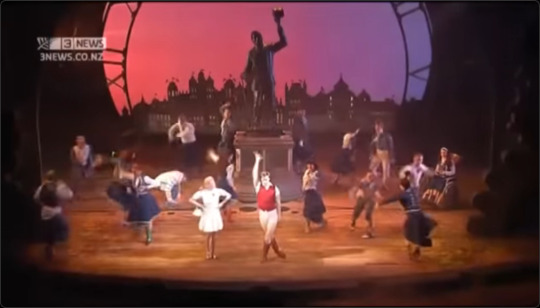
Dancing Through Life is the introduction of Fiyero, and there is a enormous difference between what he is saying and how he is saying it.
That dust line is actually a biblical allusion, with various Judeo-Christian books and prayers claiming that G-d created humans from dust, and that when someone dies, they return to that dust. Hence the "ashes to ashes, dust to dust" saying (source). So, Fiyero is nihilistic.
"Nothing matters, so why bother trying" is such a morbid idea, and its usually associated with emo music, either lots of drums and raw emotions, or quiet and sad. So, when Fiyero sings it as a musical theatre, bombastic full orchestra song, his message flies under the radar because it is so dissonant with the style.
That's the key here. Most of the time, people are nuanced, and stereotypes do not encompass the human experience at all. The emotionally confused or depressed or spiraling person isn't the one who sits in the moonlight writing sappy poetry, it's the person who manages to hide it the most easily because they've been doing it for the longest.
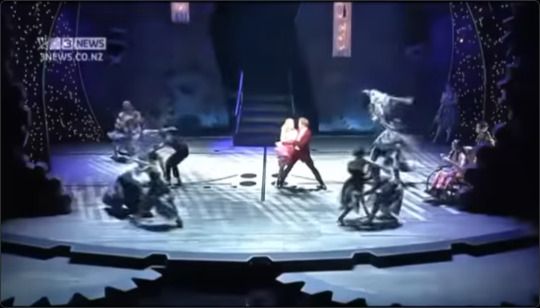
Fiyero is putting up a mask to hide his insecurities, and he is doing it by... not wearing a mask?
Lampshading is the practice of softening elements in a piece of media, letting the audience know that something is out of order or farcical, and turning it into a joke. Overly Sarcastic Productions (@comicaurora) has a video explaining the trope in detail.
In a weird way, this is what Fiyero is doing. He is turning his own crisis into a joke. He doesn't have to hide it if he can poke fun at it. He becomes self-referential, and tells people to move on past the words he is saying and focus on the fun dancing and music.
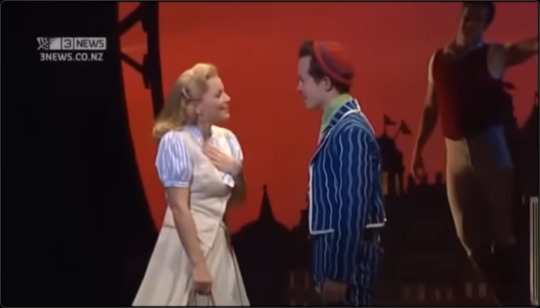
I see where Fiyero is coming from, here. Purpose is difficult to find in this world, and it definitely seems like neither good or bad are rewarded, and luck will do what it will. But I would like to present a counter point.
Everything Everywhere All At Once was easily the most emotionally powerful film of 2022, and it also discussed nihilism in detail. I don't want to get into plot spoilers, but this movie asks the question: If nothing matters, then what?
And the answer to this is clear: Everything. In a Cinema Therapy video on the film, Johnothan Decker states this:
"If nothing we do matters, then the only thing that matters is what we do."
Actions have whatever meaning we ascribe to them, and if we ascribe no meaning to anything, then everything has meaning on the same level. If nothing matters, then everything matters.
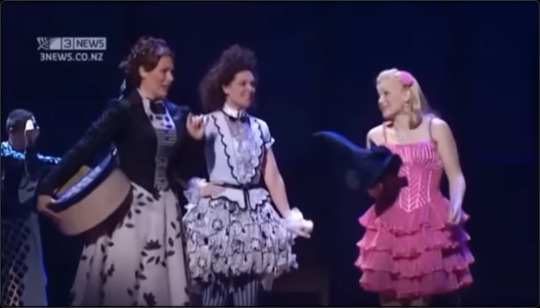
This segways into another core question of the musical and especially this song. Do intentions matter?
Galinda and Elphaba have a comedy of errors with the gift giving, specifically when Galinda sets up Nessa with Boq, and Elphaba arranges for her to receive a wand in return, contrasted with the infamous hat.
Galinda does things for personal gain, and accidentally makes someone's life slightly better for a moment, and Boq kind of does the same. Neither of the two cares about Nessarose, but they bring her happiness in the short term.
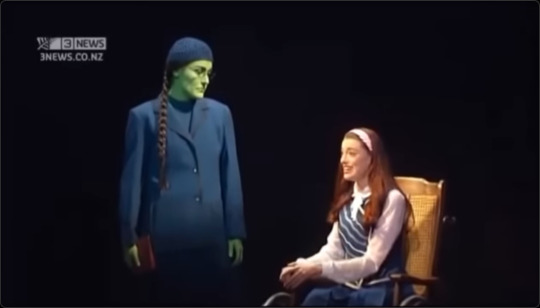
"We deserve each other, and Galinda helped it come true."
I mentioned in my post about The Wizard And I that this theme comes up there first, in association with meeting the wizard, and I think there is something else to it than just deception. Don't get me wrong, this is deception at work, Elphaba with the Wizard and Nessa with everyone around her. But that lie has a positive result here, for the moment.
It also separates the consequences from the intention. Elphaba sees the wizard and wants to improve the world, her hopes are on rocky foundations, but her actions are strong, and I have already mentioned what Galinda's actions do.

However, I would argue that intentions do matter, and that this musical agrees with me, and that is with Boq, a person whom I despise.
As a character, Boq is fascinating. He is a direct satire of the hopeless romantic of stereotypical fairy tales, think Ariel from The Little Mermaid, or Lancelot from the 1963 movie, Lancelot and Guenevere. Boq is trying desperately to court someone who does not care about him and has someone who does care fall from the sky in front of him, but he can't see past himself.
Now, pining is all well and good, you are allowed to pine, and if someone is attracted to you, there is no law that says you must be attracted back. But Boq goes a step further.
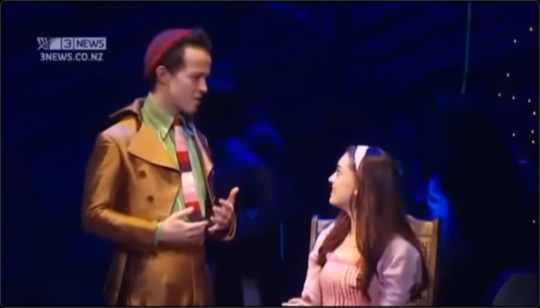
"It's because I'm in this chair
and you felt sorry for me.
Isn't that right?"
"No! No!
It's because you are so beautiful."
Boq had an opportunity to back out of the romance handed to him on a silver platter. He could have said it was just a dance, or even confessed that Galinda put him up to it, if he so desired. But Boq made a choice to keep stringing Nessarose along. He may have his reasons, but I think his actions are not excusable, and the gut punch at the end of the musical when he tells her that he never cared is a betrayal that could have been so easily avoided.
Boq and Fiyero go on to become key players in the "death" of the Wicked Witch of the West, and they do so for alternative reasons, and it reframes Dorothy's journey.
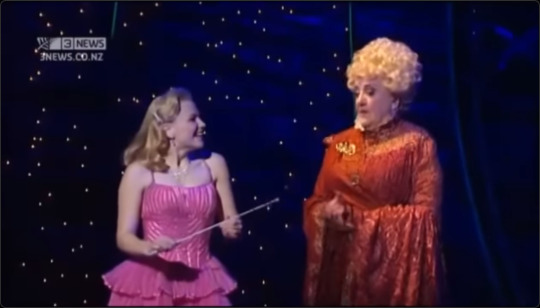
For a more nuanced explanation of what I mean, consider this: In 2019, youtuber Hbomberguy (Harry Brewis) raised $347000 for a Brittish charity organisation called Mermaids in a livestream of Donkey Kong 64, and he gave a speech in October of that year about why he did such a thing.
"I think secretly, we're always making one of two decisions, and we make that decision even if we don't know we're making it. You're either choosing to make life worse for someone you don't like, or better for people you care about.
There is an actual difference, and I didn't realise I made the wrong choice until a lot of people came over and helped change the choice retrospectively."
What you are trying to do matters, because if you keep trying to do good, even if you hit roadblocks, if you are truly committed, you will eventually do some good in the world.

I actually like Brewis' definition of right and wrong here, because it isn't overly philosophical, it pertains to individual actions. You either make someone else's life better or worse.
I have been rambling around my point for a while, so let me make it concise. Dancing Through Life asks philosophical questions about life. What matters? Is it you? Is it your actions? Is it your intentions?
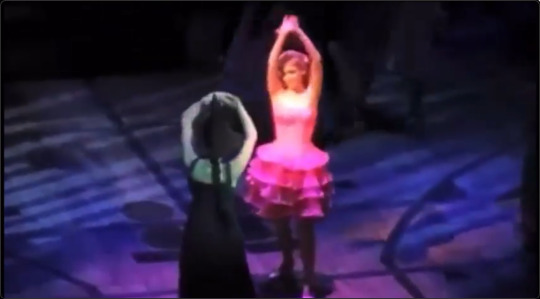
Final Thoughts
There are two other things I need to mention before I finish. First up, the extras are some of the best parts of this musical, and in this song, that is driven home. Everything comes across as so superficial, and not in a "that's bad acting" way, but in a "that's an actor playing a character who is acting" way. This carries over to Galinda's entire style of talking, but the extras knock it out of the park here. It means that the only sincere moments in the song hit with the relevant weight. Those being Elphaba and Nessa's conversation, and the Elphaba dance (something remarkably difficult to find images of).
That dance is the moment I see Glinda x Elphaba (I still refuse to use the Gelphie ship name) actually taking off, rather than in What Is This Feeling, because it's the first moment that the two see eye to eye, and Galinda finally understands Elphaba. She earns her friendship and trust by trying to make up for her mistakes. Galinda talks a lot, but actions speak louder than words, and that dance kicks off a love story.
Next week, I will be diving into Popular, a number that really takes apart the theming to an overt level only matched by one other song, and we will get to that one soon.
Previous - Next
#rants#literary analysis#literature analysis#character analysis#what's so special about...?#wicked#wicked the musical#elphaba thropp#galinda upland#wicked musical#gelphie#wicked is a queer story#fiyero#elphaba#glinda#long post
71 notes
·
View notes
Text
The Lavatory scene in Red Eye's final shooting script and the movie
One of my previous posts was about how much the first script draft of Red Eye differed from the final product. The draft discussed in this post is more or less final. This draft has all the changes made after Rachel and Cillian were cast as leads and after the test screenings. But there are still some features which didn't make the cut into the final product. I'm not gonna analyse the whole script here, but shippers' favorite scene - the lavatory scene. Yeah, you can always rely on this scene to bring some juicy stuff.
SPOILERS AHEAD
Okay let's start from the moment Lisa enters the bathroom alone.

Frankly speaking, for now, I prefer the movie version. Especially the line "Okay, get up" instead of "Oh my God..." Wes Craven said in the DVD commentary about this moment:
This was tricky, between making her totally collapse, but not have her totally pathetic. And she very quickly gets herself under control.

Next, there is an interesting description of Rippner:

Also, the message on the mirror was meant to be revealed slightly earlier, but whatever.
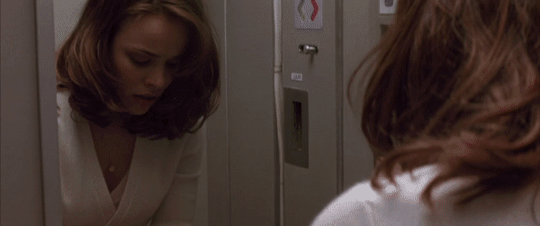
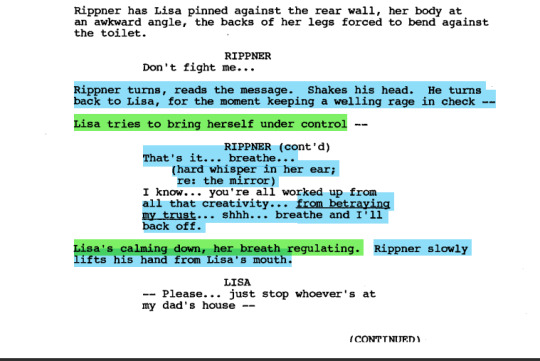
I'm not sure about Rippner's lines here, because half of it is barely audible in the film. Also quite ironic that the underlined part is not in the movie at all.
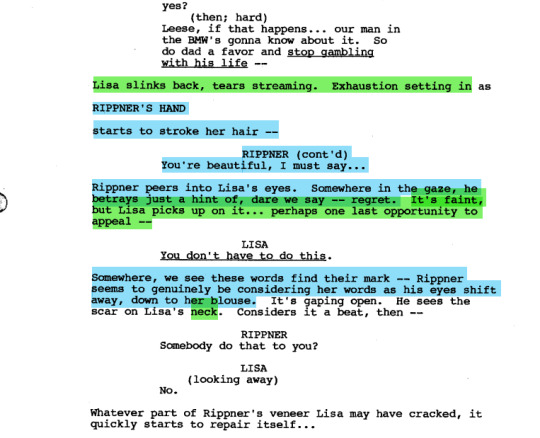
Okay, now really important stuff starts kicking in. Rippner practically spills out the fact that he is ATTRACTED to Lisa right at her face. The script makes it clear, that she now knows this and tries to use his attraction (and his regret) to persuade him to give up on Keefe assassination plan. Funny enough, she almost succeeds until he notices her scar. Personally, I think "You're beautiful..." line (and hair brushing) should have stayed in the final cut. Not only for the sake of the ship, but for the fact that without it Lisa's "You don't have to do this" sounds really naive.

Some of you may argue that this is all relevant for the movie, they just made it more subtle. Well, Movie-Lisa's best guess that Movie-Rippner might be attracted to her is the way Cillian looks at Rachel. On one hand many people point out that they do have chemistry and sexual tension, on the other the movie on its own leaves watchers to wonder whether the characters had any romantic feelings towards each other or not. And I probably stumbled upon a comment on YouTube, which interpreted the "You don't have to do this" line more as "You're so pretty, why do you have to be evil?" (or something along these lines)
Also I think that clarification would make Lisa a more nuanced character (by the fact that she tries to manipulate a villain into giving up on his villainy).
Also, as you may have noticed, the scar was meant to be on her neck, makes sence, given her backstory (He held a knife to my throat). I guess they moved it down just so Rippner wouldn't notice it earlier (though the script also mentions, that Lisa was meant to wear a sweater). I, personally, on the back of my horny mind, think he wasn't looking for scar when he gazed on her breast ( ͡° ͜ʖ ͡°).
A little note: Script-Lisa looks away saying "No" while Rachel looks straight into his eyes, but starts trembling instead.
By the way, Rippner wasn't meant to slam and choke her just yet.

I guess he just let her out to wipe out the messege. Here Lisa gives up on conving him.

Only after he finished wiping he starts to choke her. Also, pay CLOSE ATTENTION on what Rippner's lips do here ( ͡° ͜ʖ ͡°). Yep, he almost kisses her.
I guess the changes movie made here were for the sake of pacing.
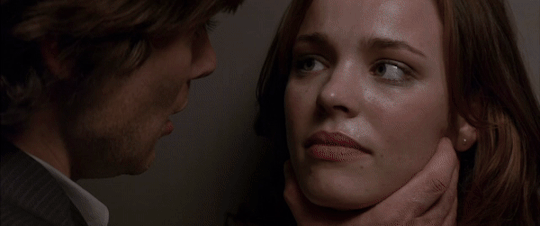

Another important difference: Rippner fixes both their outlooks to be more presentable. Lisa protests a bit.
I guess the movie crew decided they don't need to fix their look that much.
Also, I prefer the movie's "Peachy" instead of just "Good", though both lines are in the movie lol.
On the final note, I guess "Thanks for the quickie" line makes a bit more sence given we have Rippner's crawling lips there ( ͡° ͜ʖ ͡°).
So, these were the differences of the lavatory scene between the script and the movie. Hope you had as much shipping excitement as I did.
P.S: The link to the script. If you're a fan I strongly suggest to download it, it may easily become a lost media, like an earlier draft.
#red eye#red eye 2005#jackson x lisa#jackson rippner#lisa reisert#cillian murphy#rachel mcadams#wes craven#carl ellsworth
148 notes
·
View notes
Note
I think Taylor points to these references purposefully so who knows if any of this bothers her but I have just noticed such an intense turn around from swifties previously needing to defend that Taylor’s music is about so much more than men to now hypothetical, but ultra specific moments in her relationships being the topic of like, almost all song discussion. It’s not coming from an intentionally sexist place anymore, but still feels…odd.
I've been seeing much of this today and unsurprisingly I have some opinions on this. And it is okay if your opinions are different and it's also okay to acknowledge there's 23948723894732 shades of nuance when it comes to the emotional intent that we bring to the table when we talk about Taylor's music (or anyone's really, but obviously we're in the TS fandom here and talking about a very clearly personal and detail-oriented body of work).
Imo - Taylor writes songs to understand herself. And she then puts that work out into the world to have other people understand her and to have a tangible artifact of her experiences as a permanent record to validate that what she feels and what she has gone through is real and to have people perceive that and gain an understanding of her life. And then we as consumers of said art get to take those songs and feel less alone in the world because we see ourselves in those songs and can feel the gentle, ghostlike presence of a person we do not know affirming to us across the ether through this beautiful thing they've created that they've gone through something similar. And that bonds us and that's part of what makes Taylor's work so vivid and so personal for a lot of us. And then we also have the added gift of being able to take songs written about her experiences and shape and mould them to fit the contours of the lives we have lived that have nothing to do with the song's original intent.
"Tied Together With A Smile" is about Taylor's friend in high school experiencing an eating disorder and it's about my lifelong body issues and disordered relationship with food.
"tolerate it" is about a relationship that Taylor experienced with a partner who never fully appreciated her or saw her and it's about coming out to my parents and then never talking about it ever again and blatantly ignoring a part of my identity I wanted to share with them.
"Better Man" is about a relationship that Taylor experienced at the hands of someone who did horrible things to her that made it impossible for her to trust him and love him and it's about my mom and how I will always yearn to have a closer relationship with her but I know it will always be just out of our grasp.
I see my best friend's ex-boyfriend in "peace". I see the guy who stood me up on my 20th birthday in "The Moment I Knew." I see my ex-girlfriend in "The Way I Loved You".
I can layer all of my personal experiences on top of the topography that her discography has given me and they can feel 100x more nostalgic and sentimental because I'm able to understand the complexity, nuance, and humanity of Taylor's world as she writes it because I care about her! I want to know those things about her! I want to know what she's gone through! I want to feel her feelings! I feel connected to her and to her art and to myself through her music! I can feel all those tender things about my life and the smell of the air and what I was wearing and what address I was living at the first time I listened to these songs BECAUSE IT'S ALL OF THE ABOVE. IT'S ALL OF THE ABOVE.
42 notes
·
View notes
Text
Rumination n. 5 - What if Aziraphale can make a difference? On choosing each other, for real
There is a scene in s2 that I keep thinking about, and I don't see it discussed almost at all: it's the first conversation between Michael and Uriel after Gabriel's disappearance.

This is a power struggle. Very human, not celestial at all, fight for power. It's not even hidden or coded.
Now - and this could just be my brain getting smooth over this show that is devouring my soul - the more I think about this moment, the more I am convinced that this very human moment (and its various subsequent reprises) is signaling us that Heaven has, so to speak, "margin for improvement." And probably so does Hell.
I feel that we have been oversimplifying Heaven and Hell because they "look" simple and monolytical, especially when compared to the nuanced worldview that Aziraphale and Crowley developed over their 6000 years of experience on Earth. But there are some heavy "shades of grey" in Heaven. They are ruthless, for a start (see the Fall and, well, most of what happens in the Bible). They are proud and arrogant (see how they behave with Aziraphale and "37th order scrivener, but, you know, noone" Muriel). They are power-angry (which, in the context of an existence that doesn't need money or power, its just a symptom of vanity, in my opinion). They have far more human-like qualities than they should, we just don't give much attention to them because our focus is squarely on their stiff adherence to the "Heavenly code" and their role as antagonists/enemies of the protagonists.
Same goes for Hell, with opposite sign: Hastur was shocked by the destruction of Ligur, Shax and Furfur appear to have some form of camaraderie or loyalty towards each other, the demon Josh notices that Beelzebub is acting weird and asks them if they're feeling alright, and Beelzebub, well, is a Grand Duke of Hell capable of falling in love.
So, what if, given this margin, Aziraphale can make a difference?
Until now, if I am not mistaken, the most common take on what expects Aziraphale as Supreme Archangel is "he's going to realize that Heaven cannot be fixed and he will have to finally drop his idealized delusion and fight his way back to Crowley." Which I personally love as a scenario (but, to be honest, I am loving almost any GO scenario that floats in my direction: the creativity of this fandom is unbelievable and so respectful of the characters that every speculation feels like it could be Neil Gaiman's work), but it could undermine the weight of his choice.
Because choice is a theme in this show: not choice as in "choosing sides," but choice as in "making up one's mind and taking a serious, conscious, thought-through decision." And if Heaven is just a lost cause, unable to change and irredimable, then it's not much of a choice for Aziraphale to go back to Crowley. But if Heaven does react to change, if the human-like qualities that other archangels have displayed become a bridge, and Aziraphale, with his warmth and kindness and softness, actually manages to bring Michael and Uriel and others on more reasonable positions - then his choice becomes a real choice that he has to make.
Not the "easy" choice between reality and delusion but a hard choice between Crowley and the real opportunity to be the one who makes a difference.
(I am still slightly infatuated with the possibility that, just before the Fall, it was an already damned Crowley who asked him to "be a good angel" and "make a difference" because he could see how genuinely good Aziraphale was, compared to the "institutional goodness" of the others, but I have already blabbered about this in another rumination)
Also, I read a brilliant post a couple of weeks back (I will edit as soon as I find it again) about how, despite their appearance and demeanour, Crowley is basically an engineer, "armed" with a tool for creating cosmic machinery and putting it in motion, while Aziraphale is a fighter, armed with an actual sword. And this got me thinking again: in Christian iconography, Michael is the belligerant archangel, the one who is recognizable by his sword. Now, Neil Gaiman does not let pre-existing traditions dictate what he writes, obviously. But still, we could witness an unforseen connection between Aziraphale and, against all odds, the other sword-wielding entity, Michael: and it could led to some unexpected coalition, possibly even against the Metatron and the plans regarding the Second Coming.
After all, in a way, Michael has already displayed many human and very shades-of-gray traits: let's not forget that, already in s1, it was Michael the one communicating on the "grapevine that obviously doesn't exist" with Hell (I believe behind Gabriel's back: the more I rewatch it, the more I think that he honestly didn't know about it) and still is in s2. It was Michael the one bringing Holy Water downstairs. It is Michael the one that has first-hand experience of what it means to "collaborate with the enemy" in order to get things done.
I don't know how likely this is but it seems to me that it would be interesting if Aziraphale, instead of just leaving Heaven in disgust after some failed attempt at "fixing it," will have to make the hard choice between a Heaven that was starting, for real, to show signs of improvement and his old life on Earth with Crowley.
And something similar could happen on the other side, should Crowley go back to Hell (either out of rage and desperation or because something comes up that forces him to do so). Maybe he could find for the first time ever a sense of "demonic brotherhood" with his "colleagues" (maybe Shax and Furfur themselves). Something that he had never imagined during the six millennia he has spent believing to be alone in the universe if not for Aziraphale.
Maybe their reunion will be about having an alternative to their life together and choosing it anyway. If you think about it, one thing that they never had to do was deciding to be together instead of being somewhere else, doing something else, with somebody else. Being the two of them has always been their only reality - dangerous and hidden, of course, but undisputed, in a way: together since the early days in the Garden, noone else around to compete with that, no other supernatural person-shaped entity to serve as a potential alternative. Their respective head offices are two opposite voids, two negative spaces that have literally nothing that could attract them. Of course, they are in love with each other and they would probably be in love with each other in any possible alternative universe, but it's not like they have chosen to be with each other, they were just the only two person-shaped entities around, pulled together by the gravity of their respective loneliness and fears, doubts and little joys.
But if in s3 we see them acquire "alternatives", something else of value that exists outside their group of the two of them, then they will have to choose their life together for real, this time.
#good omens#good omens 2#go2#good omens thoughts#good omens 2 spoilers#go 2 speculation#crowley#aziraphale#go2 spoilers#ineffable husbands#ineffable divorce
101 notes
·
View notes
Note
what did you mean about laudna and ashton driving you nuts?
mmmmm. dangerous territory! for me, i mean. to indulge the side of me that don't give a fu about–
it's pretty interesting how this ep turned out to be a direct comparison between laudna and ashton and how they discover and come to terms with the idea that there is an option for them to ostensibly destroy themselves in the name of protecting/helping/saving the rest of the party
a few ppl have already discussed this with far more thought and nuance than i'm willing to put into words right now but something something both of them taking this as an opportunity to Be Useful and Contribute to the cause, blind or perhaps willingly ignorant to the fact that these people love them for who they are and that they don't need to Do Something in order to be loved - in fact, losing them is actually a far less acceptable outcome to the party than whatever reward they perceive to be gained from their self-sacrifice. which is all very sad and tragic and juicy and pulls at the heartstrings which i always love. but this is kind of where the similarities end?
laudna follows this with a conversation in which she tells imogen what she would want to happen in rather explicit terms. and when imogen responds by saying she'll do everything in her power to stop it from getting to that point, laudna says "i can accept that." the next morning, they tell the whole group what happened. on the other hand, ashton pulls fearne aside and has their own grave conversation but in more vague terms, at least in the sense that i don't think fearne picked up what they were putting down or at the very least wasn't given the opportunity to really process and respond to what was asked. and then ashton isolated the two of them from the rest of the group to undergo this transformation without their knowledge. all of which drives me nuts! to see the direct comparison in which one is so much more communicative than the other
and i don't think it's fair to say that this is a consequence of the party being poor communicators overall. it's somewhat reminiscent of vax's initial response to scanlan leaving in c1 - we don't know your mother's name because you never talked about it. aka there's a difference between ashton bringing up this desire or plan to hold both shards and everyone brushing it off/not sufficiently exploring it vs. ashton choosing not to ask for their opinions, ideas, or feelings about it because he thinks they won't let him do it. he unilaterally made the decision for everyone, which is the most frustrating part for me. they presume to know what is best for everyone, and they presume to know that this is the only option, despite being surrounded by not only some of the most powerful people on the planet but also the people who care for them the most. which he said himself: nobody will miss me when i die, given that we all die - implicitly saying that if i am the only one who dies, i know you all will miss me. so to me it feels disrespectful to them, because even having acknowledged that they care, he doesn't trust that they might have ideas for a better solution or that they might recognize what this means to him and try to help him survive it. or that they might not want to be "saved" if it means losing him. or that they might like to say goodbye.
i know many people are saying that this is in line for ashton's character, frustrating or not, which i think is true. but it feels stagnant to me. ashton has come a long way in terms of learning to care for these people but they have learned little about being cared for. and while laudna is trying to believe what others say to her (that they love her, that she's important, that she deserves life) with varying degrees of success, to me ashton feels like they have made minimal progress and/or aren't trying to make progress. they refuse to see bells hells for what they so loudly and clearly are - people who love and care for each other, ashton included. and unfortunately, 77 episodes in and coming up on a vastly important mission (the first in a while), this brand of hypocrisy (taliesin's words not mine!) and lack of awareness for the group's feelings in the name of High Risk High Reward is something i have a rather low tolerance for ¯\_(ツ)_/¯
and for the record i've been thinking about this a loooot because i know most of it is colored by my general apathy toward this character. and i understand that a lot of people who love this character are so so fascinated by and invested in what happened. but my apathy toward ashton is something that i've tried to circumvent or logic my way out of a LOT in the past few years and at this point it's kind of an immovable object. and doing mental gymnastics to try and enjoy someone that i simply don't makes everything so much worse! so i don't mean to rain on anyone's parade but these are my thoughts whether i like it or not
tl;dr the end of this ep didn't make me excited, it just kinda made me feel annoyed and crazy. sorry
#SORRY THIS IS SO LONG. things feel very very complicated still. in my brain. all jumbled#but the main takeaway is that i didn't like it. dkfjskdjfksdjf#anonymous#ask#answered#critical role#cr3#cr spoilers#cr meta#nova shh#cr negativity
84 notes
·
View notes
Text
So while I'm Saying Shit, I also have a problem with this idea that El was upset that Mike wasn't saying I love you specifically because her love language is words of affirmation so she really needed to hear it? I mean, first of all I think the idea of love languages is mostly useful as a quick generalized way to discuss how we respond to and express affection—a messy nuanced human behavior thing that is hard to talk about, and the show is written with that nuance, but even then I don't think El particularly craves or requires words to feel loved anymore than anyone else does. I think in s4 she was really just confused about why her boyfriend was refusing to say the word 'love' under any circumstance to her? Especially after she heard him say it once already and then she said it back to his face in response so its like, he said he loves me before and I let him know I feel the same and now he won't say it again? Not even as a way to end letters—a normal thing people do for someone who means much less to them than she supposedly does to him sooooooooooo like what's the fucking deal? The contents of the letters sure implies he holds a lot of affection for her and he brings her flowers in her favorite colors and ok we're in love and then he signs 'from' on the card and its like ????? like even as the audience you're supposed to be confused lol like he clearly has some kind of hang up I wonder what it is? Then after El smashes a girl's face in she thinks "oh yeah, the hang up is that he actually hates me because I'm evil haha lemme just start projecting real quick" and then, you know, s4 happens. I mean, it's not like she doesn't value words at all, I just don't think her relationship to them is particularly tied to her trauma like people say, or if anything, maybe she values them less because that's all Brenner would ever give her? Like, perhaps the big Love Confession hits the hardest because it came after Mike and company spent a week or whatever driving across the entire western united states to save her from the government. Idk, something to chew on.
Honestly, if anyone's love language is words its Mike lmao he's the one whos constantly telling El how amazing she is. He's also desperately trying to tell her he loves her in like 5 scenes (arguably succeeding except for not saying the actual word in most of them) before he actually does like, he wants to so bad it almost comes spilling out of his mouth against his will (except for that one time it does ha) he's just terrified of doing so because it would essentially be ripping his entire beating heart out of his chest and handing it to this powerful-in-every-way girl on a silver platter for her to do whatever she wants with—like crushing it into a fine paste in front of his eyes, killing him instantly and preventing him from having the strength to love anything ever again. Like, the other half of the love language thing is that you also speak the love language, meaning you are more likely to show affection by doing the thing you want for other people, and Mike does this waaaaay more than El does for anyone actually (something I would love to see her do more in s5 lowkey. Like, she was at a severe disadvantage before and was too busy dealing with her own shit to have a ton of emotional energy for anyone else so it makes sense, but we're matured now. I think now is the time for a heart-to-heart that goes both ways u kno).
If I wanted to be cute, I could argue that both Mike and El's main love language is actually acts of service. They're both little heroes who jump at the chance to do anything for the people they love with no regard for their own personal wellbeing. Also, adorably, the thing that gets them back together in s3 is Mike saving El from Billy, which El responds to by helping him and Lucas with the vending machine. One offering of m&ms later and we're back baybee it's the quiet understanding that no matter what they'll always be there for each other for meeee
If I'm not being cute I'm saying the idea that everyone has a main 'love language' is bullshit and you're gonna appreciate different things at different times and people are not that easily categorized but it's still a good jumping off point for discussion so—
Anyway El saves the world and Mike saves her and they're dying in each other's arms thank you for your time <3
32 notes
·
View notes
Note
do you have a preference for bethany as a grey warden or circle mage? or does it depend on your hawke?
all bethanys are good bethanys but i’ve come to the conclusion that circle mage bethany will always be first in my heart and i’d LOVE to discuss why
act 1 bethany feels powerless and lonely. she hasn’t had a fellow mage at her side since her father died. she’s caught between guilt at what her family has had to sacrifice for her sake, and resentment that it’s a sacrifice she never even asked them to make. she didn’t choose to be an apostate like her father did. nobody ever gave her the option if she wanted to spend a lifetime on the run, endangering everyone who loves her, rather than accept the world she lives in. she’s a twenty year old who just lost her home and half her family; is it really any wonder that she’s as drawn to the relative stability of a life in the circle as she is afraid of it? a life where she wouldn’t be marked out and isolated, but among people like her, who understand more than even the most well-meaning non mage sibling ever could? why does being born a mage make it her job to fight this, instead of take the life she’s given?
a bethany who goes to the wardens is pushed there by her desperate sibling; a bethany who goes to the circle personally agrees to come willingly, despite hawke’s protests. it’s a minimal but very defining change in agency. her experience in the circle, too, is what she makes of it. we see little of the life she builds there, but she is clearly able to excel and be recognised for her own merits; even if it weren’t mentioned in her dialogue how impressed they are with her training, and in her letters how she has taken on the role of helping with the young initiates who also in game clearly look up to her, we constantly see her at the first enchanter’s right hand. bethany’s circle mage dialogue in the dlcs—some of the best dialogue in the game, imo—makes it clear that not fighting the circle is a choice she’s made. she tells anders, “i’m not leashed”, “i can pretend to be miserable if you want, but i’m not”. she tells aveline, “life is what i need it to be.” if hawke offers to help her escape, she says the circle is comfortable... for now. she’s smart, she’s capable of defying and deceiving the templars when required, and she’s making her own decision to do her best within the circle and see what comes of it. maybe it’s not healthy for her to give in to her imprisonment. in protective older sibling mode, i hate to see her talk like that about the mistreatment and danger she faces, as if it’s acceptable. but what both hawke and bethany can get from the circle mage route is that her life outside the circle can’t really be freedom either until it’s her choice
in the circle mage route, bethany can’t be badgered into learning her own self-worth by well-meaning lecturers. she has to learn from her own experiences, and choose the mages’ fight on her own terms. thematically, i think it’s one of the most compelling thoughts on the topic of the circle that da2 has to offer: someone with an open mind experiencing it, being grateful in some aspects for what it offers, exploring that it may not be as bad as some apostates fear and it may be possible to salvage a life from it, but still absolutely ultimately learning from it that mages deserve more. she says so outright: that her time in the circle is what she needed to “see the need to free my fellow mages”. not just learning the value of the life she once had and her own freedom, but taking up an active purpose that also brings into play the community she gained from the circle. it’s a brilliant, nuanced arc for her and it makes me so so proud. it also makes you see the chantry explosion with a distinct perspective and in, i think, its best light: as a call to action that sharpens the battle lines into focus, and acts as the final catalyst to let mages see what’s necessary past their fear. for me it’s hard to imagine what i couldn’t justify, watching my little sister finally believe her freedom is worth fighting for
narratively, it’s my favourite route for hawke’s overall story as well. bethany going to the circle defines the stakes of da2, with meredith’s sword permanently at your little sister’s throat, creating a desperate tone no other type of playthrough can offer. the warden route on the other hand distances her from the story, making her cameos feel sudden and stilted. the conclusion of da2 is very much about circle mage bethany, both her life and her way of life on the line, hawke finally able to defend or take up arms against the last of their family. by contrast, when grey warden bethany shows up to take whatever side hawke does, it gives the impression to me that she’s only talking like she’s completed a character arc during the last straw because, well, the writers know this is where the game ends. we don’t see or earn her progress. the circle mage bethany route also feels like hawke’s choices are really challenged, rather than hawke making an executive decision to “save” bethany in yet another way she didn’t ask for, and then basically waiting until she comes around to it and apologises for being mad
that being said, i adore bethany getting to fully express her bitterness and anger as a warden, and i think her hatred of that path makes her one of the most interesting warden characters in the entire series. it also involves her unlearning her repression of her negative feelings, a repression which absolutely continues to be at play in the way she defends her life in the circle and downplays its horrors for the sake of those that love her. the warden route definitely has its merits. also her warden staff does fire damage which is LITERALLY her thing why tf does her circle mage staff do nature damage i hate it here genuinely
99 notes
·
View notes
Note
That's the problem though, nonbinary identities are always seen as "academic" and not casual. Cis people love to say that we're too complicated and only academics understand us, trying to turn nonbinary identity into a classist thing, when nonbinary people need to be included in casual things too. Saying "nonbinary inclusion is only important in academics and not casual stuff" is the real classism here because it keeps people from understanding us. And you do that too, by saying "transfems don't experience higher rates of violence" but only bringing up transmasc as a counterpoint, ignoring all other trans and nonbinary people. We exist outside of adademics, and to say that non-binary inclusion doesn't really matter outside of that is exorsexist and actively plays into the narrative that nonbinary inclusion is hard or impossible. like other queer people get to exist and be recognised in casual too but non binaries are confined to university
Waist why are nonBinary less casual than transmasc or transfem? Exist as casual and lower class as trans mascs and femmes.
Are you really saying nonbinary inclusion is more important in colleges than in casual social media like... you don't need a degree to not be exorsexist. sincerely an agender who never seen a college from the inside. Sad seeing you get more more exorsexist.
These asks were all sent very close to one another, so I'm responding to them all as if they were one ask.
I never said that nonbinary identities are "academic" or "less casual." Also, I rarely ever see anyone use "academic" to describe nonbinary people- maybe in relation to queer theory, but honestly? It feels like you are stretching here to try and conflate me saying "I don't feel like its worth getting angry about binary language in people's casual Tumblr posts that aren't meant to be in-depth analyses of gender" with "nonbinary people are too complicated" by acting like I was talking about nonbinary people in academia?
When did I say nonbinary inclusion is more important in colleges than social media? Where did I say that sentence?
If you are referencing that recent reblog of the baeddel-txt post, that was specifically in reference to anti-transmasc violence, which is why I only brought up anti-transmasc violence. But additionally, It is frankly quite hard to find good studies focusing on abinary experiences transphobia. Very often, nonbinary people are just grouped into "transmasc" and "transfem," and other times nonbinary people are separated in data by AGAB. I have never seen a study or paper focused exclusively on exorsexism. This sucks! I know it sucks, because a lot of my life has been negatively affected by exorsexism and its very frustrating how little in-depth discussion there is of exorsexism. But honestly when it comes to data around the violence experienced by trans people, the conversation is binary because so much of the data is binary. And, to a certain extent, a lot of nonbinary people's experiences are colored by the binary; exorsexist violence is very real, but a lot of nonbinary people's experiences are anti-transfemininity or anti-transmasculinity or both, even if their experiences can also be different than binary people's generally are with those forms of violence. It is important to be inclusive of nonbinary identities in the discussion of transphobias but frankly there's a lot more nuance when it comes to nonbinary people and transphobic violence, not to mention how a lot of exorsexism (like attacking a person for not being obviously male or female) is seen as synonymous with "general" transphobia, so it gets discussed without being named as exorsexism or misandrogyny.
Anyways. Idk. I think maybe you are reaching a bit with your interpretations of what I'm saying. I said it in that other ask but online communities are pure communication, so language-as-activism is the most obvious and easiest thing to focus on. But I am in fact a nonbinary person who Does Things In Real Life that you do not see. If you are really getting this hanged up on me not caring that much about the language people use in Tumblr posts maybe like. get some perspective?
46 notes
·
View notes
Text
The Power Fantasy vs. The Mary Sue
I think one phrase we need to work back into discussions around stories and story crafting in general is, "power fantasy."
And I think in the course of discussing power fantasies, we can reexamine the term, "Mary Sue" which traditionally only referred to original characters put into an established universe who was unrealistically capable at saving the day and winning love. Because clearly the definition has expanded beyond that in how it's used, and I would argue, the new definition of a "Mary Sue" is: "A power fantasy that the viewer does not find exciting or personally relatable."
I think fear of creating a "Mary Sue" has stifled some creators (particularly female-identifying ones) when it comes to including power fantasies in their stories. Because it's ok and even the point for fiction to contain a power fantasy! A power fantasy is something cool or desirable that does not happen in the real world, or doesn't happen regularly, happening to the protagonist in a way that allows the audience to enjoy that experience vicariously.
Let's get into some examples of what I mean:
A good example of a power fantasy might be the elemental bending of the series "Avatar: The Last Airbender". It is objectively cool to be able to cast magical elemental spells by doing martial arts, which are also cool.
A romantic power fantasy that we see very often is, "This love interest is very powerful and dangerous towards everyone else in the world, but they are sweet and loving with the protagonist and would never ever hurt them." Someone like a mob boss or an assassin or even a literal demon who finds love with the protagonist and turns those qualities to their defense. "Beauty and the Beast" is an example of this trope but it can take many forms.
Another power fantasy might be to take a complex political or military situation and saying it can be solved by an individual with a single heroic act.
For example, destroying the Death Star in Star Wars, something that's accomplished by young protagonist Luke Skywalker who is fresh off the farm, being enough to defeat the Empire (in the first film, before the trilogy was fully planned), or killing Emperor Palpatine at the end of the trilogy. (Yes the expanded universe adds nuance to this, but within the films themselves, these single events are defined as decisive victories.)
Another example might be how throwing the One Ring into Mount Doom is enough to end the threat of Sauron's evil in Middle Earth forever.
A power fantasy might be the ability to magically gain a lifetime of skills, such as downloading Kung Fu in "The Matrix" or a magical serum making Steve Rogers into a super soldier in "Captain America", or any number of "chosen one" stories where an otherwise unremarkable but relatable individual is suddenly thrust into a world of adventure and magically granted the abilities needed to navigate it.
And in more personal stories, the idea that that a single gesture or speech or demonstration could be enough to change the attitude of an authority figure, or a loved one, or a group, is a power fantasy. Not that this can't ever happen in the real world, but it is a power fantasy to say that a single impassioned speech can bring an end to widespread bigotry, or that winning the big game will earn the protagonist the love and respect of a distant parent or a potential romantic partner.
There's nothing wrong with power fantasies. Power fantasies are enjoyable, they are often the meat of the "so what?" of a story. Adding a cool power fantasy to your world like can be the hook of the story, or the spice, or the whole story could be nothing but layered power fantasies, in fact a great many really good stories are!
Where power fantasies fail or are leveled with the accusation of being "Mary Sues" is when the audience does not find the power fantasy relatable or exciting.
In fanfiction, Mary Sues/self insert characters are often created deliberately in stories that extremely personal to the writer, who is often a beginner. These characters and their stories are not intended for a wide audience, they're merely a written expression of a daydream the writer has. That means that they're not meant to be widely relatable. The author just wants to imagine being the 10th member of the Fellowship of the Ring and having Legolas fall in love with them. Others might find it "cringe" but the fiction is serving its purpose in bringing joy to the author. It might just not be widely popular.
However, this reputation of Mary Sues being these intensely personal stories that aren't trying to balance relatability in pursuit of a wider audience have somewhat muddled the discussion around what the accusations of something being a Mary Sue are actually saying. Because what they're saying is: I don't find this story relatable.
Rey in "The Force Awakens" trilogy was roundly criticized as being a Mary Sue. I like to use her as an example because it's one of the most public discussions of late that used the word, and because I understood both sides of the accusation.
To be sure, an element of the accusation was sexism. Because Rey's story wasn't all that different from many male protagonists and yet many male viewers found her power fantasy unrelatable because she's a woman.
That said, her story was also somewhat sloppily constructed when compared to, say, Luke Skywalker. Luke Skywalker was a well-constructed power fantasy because he did things that the viewers wished they could do: like be plucked up from their boring job on the farm to because a cool fighter pilot trained by a space wizard with a laser sword that once you mastered it you'd magically know how to use perfectly because of the Force, and in the process, Luke got to hang out with cool people like Han Solo and Princess Leia and literally save the universe. These are cool, fun things that you average kid would love to do!
Rey's story was muddled. She was given all the same magical powers and many of the same story beats as Luke Skywalker, but it wasn't in pursuit of a coherent power fantasy, not for women who might relate to her, nor that men in the audience might not personally relate to but could at least understand wasn't for them. No one bothered to ask a female fan of Star Wars what they wished they could do if they were in the Star Wars universe. Because I imagine being the secret descendent of Palpatine (???) wasn't one of them.
But this shouldn't mean we can't have women in Star Wars who get a bunch of magical powers and save the day! And that was where the discussion broke down. Power fantasies are good. Sometimes, power fantasies aren't relatable to the person calling a character a Mary Sue. Sometimes, it's because it's not meant for them.
For example, I think that Maverick in Top Gun is an unbearable Mary Sue, because I don't find the desire to become a fighter pilot who saves the day all that compelling. But I at least understand the power fantasy isn't for me.
The key is to make the power fantasy fun and relatable to the intended audience. The key is to understand the power fantasy being created. When trying to expand to a broader audience and tell a good story, the power fantasy usually also needs to be roadblocked by some obstacles or rules, or there need to be tradeoffs, but they are usually things that the audience also finds exciting.
Like: you get to be a super cool fighter pilot, but first you have to go to fighter pilot school, where you'll meet tons of other beautiful and cool people, which is also a power fantasy, and then you get to be a magically gifted and skilled fighter pilot who saves the day!
Or: You get to be a crime-fighting badass who saves the day while dressed up like a bat (for some reason) but first you have to travel the world and learn martial arts and go on a bunch of adventures before you're skilled enough to do it.
That said, sometimes an element of the power fantasy is that the character just naturally achieves it! There just usually has to be other tradeoffs. Like Neo can learn Kung Fu with the touch of a button in The Matrix, but now he has to use these skills to fight some serious bad guys before he gets the praise of everyone around him, just like Captain America and the serum, he now has to go save the day before he can get his parade. You don't get easy powers and widespread adulation at once, that feels cheap. That's why the Mary Sue showing up and impressing the Fellowship with her magical skills before she's done anything to actually help them feels cheap.
Mostly, the point of this essay is to help those, like me, who grew up around accusations of all original female characters being Mary Sues to help overcome this knee-jerk fear and understand when the criticism was valid and when it was just sexism. There should be more female power fantasies in mainstream fiction! There should be just as many as there are male power fantasies! But, sometimes male and female characters can be Mary Sues, which is expressions of power fantasies that feel unearned, or unrealistic, or just not fun for the audience.
Sometimes it's not fun for the audience because they don't relate to the fantasy being explored, and that's ok! The power fantasy is still allowed to exist! Because my god, if I have to sit through yet another magical white guy chosen one who is super cool and saves the world and gets the girl, viewed totally uncritically as the Mary Sue it is, we can at least create the versions that speak to a wider range of personal experiences than that.
101 notes
·
View notes
Text
THE END JUSTIFIES THE MEANS: A Little Discussion into the Machiavellian Concept and Its Applications to MILGRAM

Hello there!! Welcome to my discussion into MILGRAM and the Machiavellian concept of the end justifying the means. Apologies in advance if stuff doesn't make sense, I feel like this was a very complicated thing to explain??
enjoy the es headers to divide some of my thoughts lol
I was thinking about something and the phrase "The end justifies the means" popped into my head, especially for Haruka.
Like, I feel like the end (getting his mom's attention) certainly justified the means (murder) in his point of view.
But, such an idea is often frowned upon, as "That snappy justification for everything “sinful and wicked” sounds good on paper at first to some realists, but in practice, it is a slippery slope to despotism and immoral horrors. See Hitler, eugenics, and other horrors like that." (Source)

However, the Machiavellian concept has more nuance to it.
"Machiavelli in all cases is implying that “the means” matter, and “the ends” don’t magically justify them, yet sometimes it is worth accepting all the ramifications of “unjustifiable means,” and the damage they do to one’s reputation, for the end goal.
In other words the ends don’t cancel out the means in every respect, but they may none-the-less justify to some extent the original less-than-virtuous actions needed to secure the ends. . . .
DO THE ENDS JUSTIFY THE MEANS? The ends can sometimes justify the means, and the ends are often more important than the means. Sometimes, one must muster up criminal virtue to ensure an end which brings the “greatest happiness,” but one must understand that we are talking about the “greatest happiness” theory here. Thus, people should consider the philosophy of consequentialism and consider the morality of the means as well as the result of the ends, and not just seek their ends by any means without consideration. Machiavelli as a political thinking, virtuous master, and republican would no doubt apply the same sort of reason to the seeking of a perfect happiness theory. Truly, one could argue, that only a tyrant would consider ends to justify means – period…" (Source)*
*The source is from the same link as above.

Now, I'm not calling Haruka a tyrant (he's literally 17 and was neglected as a child, of course he'd do what he could.)
However, Haruka believes in the original idea, that his mother's attention justified killing someone. But, here it states that to some extent, these actions can be justified.
So, Haruka can't entirely justify his actions because of just the end. He begs for his INNOCENT verdict despite what he can and says he will do. There are obvious consequences to these actions and it's not fair to take just the ends into account.

In fact, as I write this, it makes me believe that MILGRAM, underneath all of this, is asking you:
"Does the end justify the means?"
You see this throughout the entire project, either subtly or directly:
Haruka - As aforementioned, does getting his mother's attention justify killing someone?
Yuno - (I'm using the pregnancy entrapment theory here as it's very plausible, but you could use many different theories.) Does getting someone's attention/love justify trapping them in a pregnancy?
Fuuta - (help this one's complicated ^^;;;) Does someone dying justify your mindset of destroying all "evildoers"?
Muu - (See, this one is complicated as well as her murder and why is heavily debated, so I'll go with Muu trying to kill Rei because she wasn't forgiven and also because she wanted the suffering to end. Please let me know if there is a much more nuanced idea.) Does the ending suffering justify killing someone?
Shidou - Does saving a singular person justify all the other people they've killed to save them?
Mahiru - (See, once again, complicated, since we have no idea what her murder is, but I'll try a guess. Once again, please let me know if there is a much more nuanced idea!) Does someone dying justify overwhelming love?
Kazui - Does someone dying justify lying, but telling the truth in the end?
Amane - Does someone dying justify your faith?
Mikoto - Does protecting someone (or in this case, an alter) justify killing someone?
Kotoko - Does serving justice justify possibly killing someone?

One thing I forget to mention in the original posting (and I'd like to thank @inferablossom for this point! Please take a look at their reblog here!) is the application with Es and MILGRAM itself.
In their words, they say, ". . .the treatment of the guilty prisoners. . . that's an important thing to look at. All the prisoners who were voted Guilty had their thoughts rejected in the fork of hearing lots of voices condemning and judging them, something that's been not unfairly called out as psychological torture. We are being asked to judge these prisoners as forgivable or unforgivable. Some of them, people won't find forgivable, and many have stated an intention to forgive them later, but not now, with an intention to make them 'better' in some way. But can we justify essentially subjecting people to psychological torture to achieve this aim? And on the other side, for Kotoko, many people likely voted her forgivable based on her crime, but she also deemed it as accepting her deal and therefore sanctioning her violence against other prisoners. Can we justify actions that could lead to her harming many people?"
As I stated in my reply, I honestly wasn't looking into MILGRAM because I was so focused on the prisoners, but it's a great point!
I'm basically restating my reply here, but:
Can we justify putting prisoners through "psychological torture" to ensure "betterment"? Can you forgive someone terrible to save someone else?
For example, Haruka and Muu. After Haruka made that threat in his 2nd VD, people must have seriously been considering voting for Muu's innocence to stop him from committing suicide. However, we all automatically went to a guilty verdict.
Voting for Kotoko's innocence caused her to beat up the other prisoners. So, are you able to justify these actions that can lead to more?
As an audience, we must see if the ends justify our means, see if violence can justify forgiveness, and if "betterment" (or in what Alice said in their tags, harm mitigation) can justify psychological torture.
This is very reminiscent of Fuuta's 2nd MV, where he yells at Es for being just like him. Es, and I suppose us as well, justify their actions by saying this is MILGRAM and they must find the truth.
(Can finding the truth behind someone justify psychological and physical suffering?)
It also reminds me of Amane's voting! Everyone wanted her to realize her murder, but it caused her to become more "stuck" with her beliefs. Can betterment justify a guilty verdict, causing psychological torture, to realize one's murder?
If we were to judge ourselves, would it be fair to say we'd give ourselves a GUILTY verdict?

Quick Side Topic: In voting in MILGRAM, I like to take into a few factors: personality (it is not affected as much, but depending on the situation, it does help), actions, and the crime itself.
I'm not saying anyone who voted certain prisoners the opposite way is wrong to vote that way, but I like to think of these factors to fairly judge, as if I was part of a jury in a trial.
For example, since her voting period ended last month, Muu. I voted her guilty because of her disregard for Haruka's threat and guilty prisoners' wellbeing, saying they deserved it, no? (In my eyes, no one deserves such a fate unless they have done something EXTREMELY, EXTREMELY wrong. I'm not justifying murder, but I'm saying the actions done to them were wrong.) Her personality didn't really swing my vote any way. Her murder, however, did. In my eyes, it seemed like she was trying to get retribution for her bullying (I have this whole theory that one of Rei's friends were being bullied, killed herself, and Rei called her out on this.)
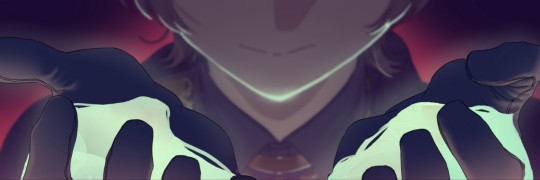
Back on track...
Once again, there is so much more nuance to each of these characters than DOES THE END JUSTIFY THE MEANS? Haruka is certainly more than wanting his mother's attention; Yuno more than trying to get pregnant from someone; Fuuta more than his mindset; Muu more than her suffering; Shidou more than his dead patients; Mahiru more than her boyfriend; Kazui more than his lies; Amane more than her faith; Mikoto more than his DID (Can't recall if this is the right term.); and Kotoko more than serving justice.
But, that's what some of their ideals and murder itself boils down to, can you justify murder? Can you look at why they did it (motive/goal), what happened (murder/means), and your own morality and decide if you can forgive someone?
Can you look into yourself and truly find that there is a justification for murder?
In the words of Es in former English subs for UNDERCOVER, "You get to know them and tie them with their EGO? Can you really judge them? Is it really okay to be done with deciding with just your EGO? Will you be able to forgive them after listening to their sins?"
Can you look past the less-than-virtuous means to justify the end?
In the words of the new English subs, "Shouldn't you look beyond your EGO, before it all ends?"
Can the ends justify murder?

AUTHOR'S NOTES:
If you've made it this far, thank you for reading my little discussion into this topic. Once again, I apologize for any confusing parts in this. I myself am still trying to grasp the concept, but my thoughts are now in writing.
I'm not well versed into some of these characters, so I am willing to edit this to fix any mistakes I've made in their little analysis of them! Thank you for your help if you do!
I think the first thought of this concept and how it was comparable to Haruka and it started snowballing.
When I realized I had my thoughts down in a whole essay/discussion, I realized it would probably be best to divide this up into easier to read chunks??
MILGRAM is an amazing music video project and considering the release of I Love You is soon, I'm excited to see what is in store. If I recall correctly, they said this was an intense trial, so oh dear! ^^;;
Here's to more amazing songs to analyze!
#Once again thank you for reading this long ass discussion jalchdichf#mug talks#milgram#mug theorizes#milgram project#sakurai haruka#haruka sakurai#kashiki yuno#yuno kashiki#kajiyama fuuta#fuuta kajiyama#kusunoki mu#muu kusunoki#kusunoki muu#mu kusunoki#(so sorry to all the muu fans :()#kirisaki shidou#shidou kirisaki#shiina mahiru#mahiru shiina#mukuhara kazui#kazui mukuhara#amane momose#momose amane#kayano mikoto#mikoto kayano#milgram kotoko#kotoko yuzuriha#yuzuriha kotoko
103 notes
·
View notes
Note
I'm kind of going to go the opposite route to swordfright and say I'm not a fan of when c!Quackity is written as Pure Unfiltered Evil. Like, obviously he's not the nicest guy out there, he's done—let me check… *a lot of shit*. But it can sometimes feel similar to the treatment c!Dream gets from the fandom.
But then again, totally okay if that's the story you want to tell! The only problem is when people bring that stuff from fics to analysis; that goes for any character.
the ask from swordfright kinda compliments yours, really, and at the end of it all we get a complete statement that I think applies to all characters in the story
all characters are heroes of certain stories and victims of others, and they are definitely villains in many others. and all of that needs to be acknowledged, especially if we are to Discuss canon. it's valid to ignore parts of the character especially when we write from the perspective of someone they have a particular relationship with, but these fandom views don't have place in the actual story analysis
there is a lot of nuance to all characters on the SMP so to only choose one feels like taking two barbie dolls and waving them around
as one anon said, there is a line. and that applies to all of these
yes, c!Wilbur can be depicted as a hero in c!Tommy's eyes, but it would be stupid to ignore the emotional abuse that was inflicted in the process
yes, c!Quackity is a fucked up individual that tortured someone for fun. but he also underwent a lot of trauma at the hands of his fiancé and then when he got engaged later to someone else, they neglected him
yes, c!Dream was hurt in prison and reduced into a whimpering begging mess. but he also murdered one of the people responsible for the torture when he had the opportunity
it's cool to see people lean more into one or the other with the good/evil hero/victim/villain thing, but the main thing people seem to mind is when it's Just One and all the rest of the character is erased
does this make sense?
#asks#elmhat#theres a balance to keep and when someone ignores the other aspects it just kinda sucks#especially if its a long fic with several chapters like ://#tropes discourse tag
25 notes
·
View notes